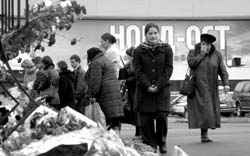Lethal Victory

Yesterday was a day of mourning in Moscow over the victims of the terrorist attack, those who had died of gunshot wounds and those killed by an unknown gas applied by the special forces storming the theater. As of yesterday, the death toll is 118, including 116 killed during the Spetsnaz attack. The tragedy in Moscow has also affected Ukraine; three Ukrainian nationals are reported among the casualties (of about forty among the hostages). The information is being accumulated. Russian President Vladimir Putin apologized to his fellow Russians in a televised message to the nation. Moscow now has firsthand experience of large-scale terrorism, and the shock may never be forgotten. Whether consciously or subconsciously, the morbid experience will determine almost all of Russia’s life in the near future.
“Contrary to all speculations about whether or not that gas ought to have been applied when storming the theater and freeing hostages, I would like to stress the stand taken by the president: the main thing is that people are alive, that the Russian government did everything possible to save human lives,” Olena Hromnytska, press secretary of the Ukrainian president, said at a briefing yesterday.
The catastrophe started not when ordinary — not elite — apartment buildings exploded in Moscow and Volgodonsk. Not even when the first Chechen War broke out. It started when people found themselves calmly hearing about and watching that war as just another aspect of life. After the Soviet Union’s collapse several generations grew up in the outskirts of the former empire, knowing nothing but war (declared or undeclared). They grew up surrounded by violence and taught to hate others, to regard whole peoples as their enemies. Finding fanatics among them was not difficult, and they saw vengeance as the sole objective of their own existence. It was an end justifying absolutely all means. In the political realm, any means are traditionally justified by such ends as “revolutionary expedience.” This is probably why none of the wars fought in the post-Soviet theater of operations has ended in peace.
While the hostages were held in Moscow, countless commentaries were heard from various experts, from different countries. They all agreed that terrorism cannot be justified. However, Russia’s policy in the Caucasus was certainly among the reasons for over seven hundred peaceful civilians made to suffer on that particular tragic occasion. Largely owing to the Kremlin’s information policy, a Chechen has become nothing other than a bandit, enemy number one to the Russian in the street (although in reality the Chechens have done little to refute this image). Other stories with hostages, demands for millions of dollars in ransom, and demonstrative executions of hostages are still fresh in our memories.
The horror in Moscow cannot be explained by using any logical constructions. Any representative of what the Western press used to describe as “rebellious Chechnya” could have easily predicted that an act of terrorism of that nature would antagonize the entire world, especially in the aftermath of September 11 and the ongoing campaign against international terrorism. Attracting world attention to the Chechen problem that way could and would give rise only to negative emotions. But perhaps they wanted it to inspire fear, to prove that the Russians could not feel safe even at their capital? That no punitive operations would put an end to the terrorist guerrilla war? In this sense what happened in Moscow could be compared to what happened in the United States on September 11, 2001. As on that occasion, Russia now has an opportunity to emerge as a solid nation, rallied not against something (like the Chechens), but for something: for the safety of its citizens, for its national policy to become something else, rather than a source of national insecurity; for its people to finally have the right to know the truth however ugly; for the president to address the nation in timely fashion.
There are also questions addressing Ukrainian authorities. The first and traditional one: Was every effort made to liberate the Ukrainian nationals among the hostages? Why does Ukraine not demand that Russia make public knowledge the kind of gas used when storming the theater and its characteristics? Will this solidarity with the Russian people turn into unquestioning support of the Russian policy?
Victors are not judged. This adage ought to have been discarded long ago. There were no victors in the Moscow tragedy. Only the whole people can be victorious after having overcome such shock and fear, and after it demands the truth from its leaders.
(Read also the interview with National Security and Defense Council Secretary Yevhen MARCHUK on page DAY AFTER DAY)






